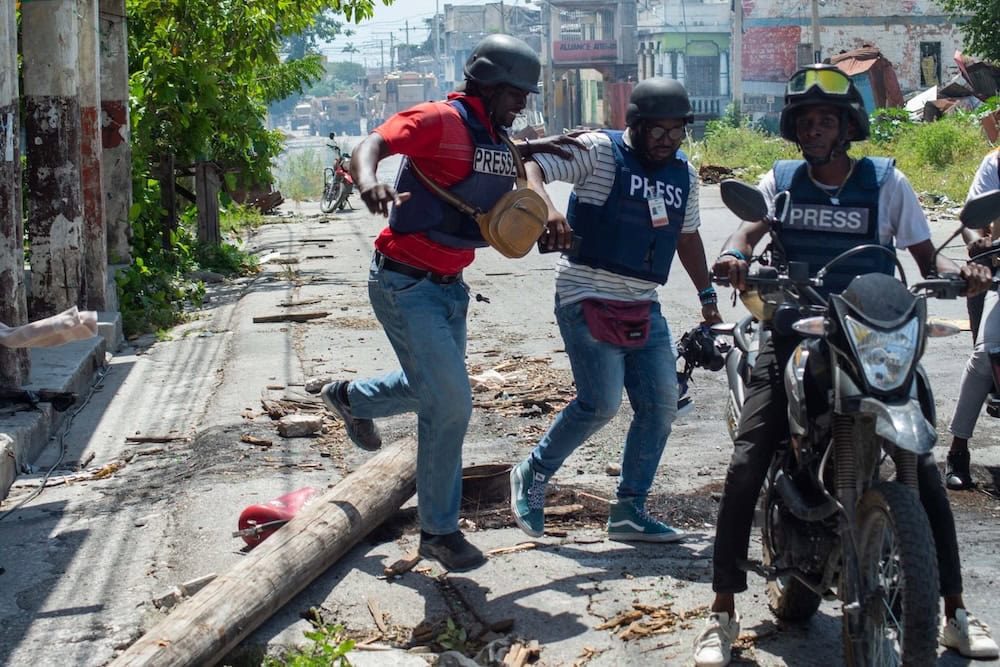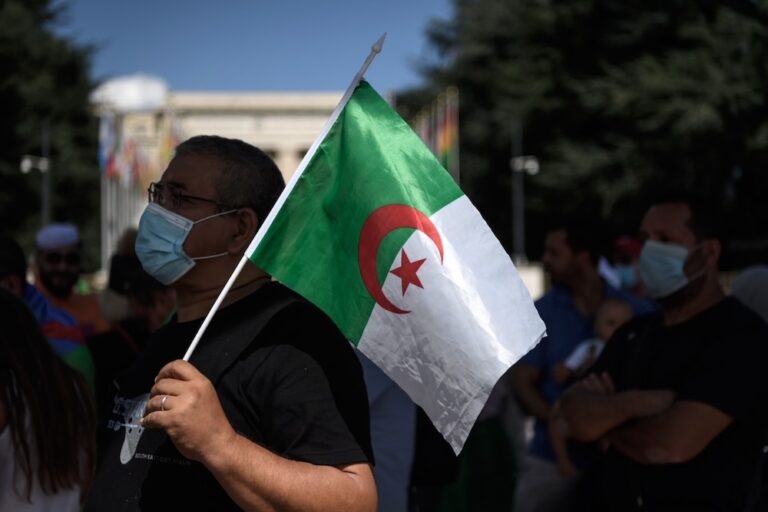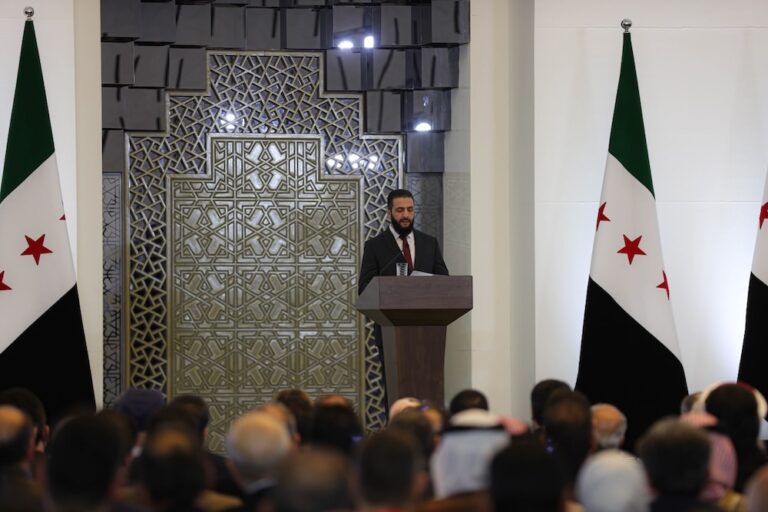More than a decade after the UN declared an International Day to End Impunity for Crimes against Journalists, and more than 30 years after CPJ began documenting these killings, nearly 80% remain unsolved.
This statement was originally published on cpj.org on 30 October 2024.
An overwhelming lack of justice for murdered journalists is a major threat to press freedom. More than a decade after the United Nations declared an International Day to End Impunity for Crimes against Journalists – and more than 30 years after CPJ began documenting these killings – nearly 80% remain unsolved. A CPJ report.
Two small nations – Haiti and Israel – are now the world’s biggest offenders in letting journalists’ murderers go unpunished, according to CPJ’s 2024 Global Impunity Index, which measures unsolved murders in proportion to a country’s population. This year is the first time Israel has appeared in CPJ’s index since its inception in 2008.
In Haiti, ranked No. 1, a weak-to-nonexistent judiciary, gang violence, poverty, and political instability have contributed to the failure to hold killers to account. Haiti joined the index for the first time in 2023, in third place, as criminal gangs took over large parts of the country following the 2021 assassination of President Jovenel Moïse, plunging the press into an “existential crisis” that has forced many to cut staff or close altogether.
Israel’s targeted killing of journalists in Gaza and Lebanon during a relentless war drove it up to the No. 2 spot on this year’s index, which covers the period from September 1, 2014, to August 31, 2024. CPJ has documented the murder of five journalists – four Palestinian and one Lebanese – since the war began, and is investigating the possible targeted murders of 10 more journalists. Given the challenges of documenting the war, the number may be far higher. Overall, Israel has killed a record number of Palestinian journalists since the war began on October 7, 2023.
How CPJ defines ‘murder’ and ‘impunity’
CPJ has been recording data on journalist killings and imprisonment since 1992. Our methodology used since that time across all countries is as follows:
Murder
Only cases defined as “murder” are included in the impunity index. CPJ defines “murder” as the killing of a journalist, whether premeditated or spontaneous, when our research enables us to say with reasonable certainty that the individual was killed in direct connection to their work as a journalist. In many cases, we are not able to say conclusively that the killing was connected with someone’s work (for example, in countries with high levels of corruption and crime, such as Mexico, or during wars with high levels of general civilian casualties, such as the Israel-Gaza war). The fact someone has not been classified as having been “murdered” on the CPJ database should not be taken to mean that CPJ considers the individual to have been lawfully killed.
Impunity
Impunity occurs when individuals or nations are not held responsible in these murders. Full impunity, which our impunity index measures, means no one has been held to account in a journalist’s deliberate murder.
Other Classifications
Please see CPJ’s methodology for further details on classifications.
CPJ continually researches and updates cases and can change classifications as more evidence is gathered.
Because CPJ’s impunity index measures the number of unsolved journalist murders as a percentage of each country’s population, Israel and the occupied Palestinian territory’s larger population puts it behind Haiti on a proportional basis, even though it has more cases. Only nations with five or more unsolved murders are included in the index. Israel was not included in last year’s index because the war in Gaza started after the index cutoff date of August 31, 2023. See more on the index methodology here.
More on impunity
- After 3 decades, 30 murdered journalists still have no justice
- More impunity with a wave of 2024 killings in Pakistan
- Explore CPJ’s global database
Globally, CPJ’s index found that the vast majority – 77% – of journalists’ murderers have escaped with full impunity, meaning no one has been held to account for their murders, so they remain unsolved. That’s an improvement from the 90% rate CPJ recorded a decade ago and slightly better than the 78% CPJ documented in 2023, but certainly no reason for celebration. Impunity has become entrenched around the world, with about four out of five killers of journalists consistently going unpunished.
While Haiti and Israel have overtaken long-time occupants of the top spots on the impunity index, that does not mean that other offenders have improved their bleak record in achieving justice for journalists.
Somalia, Syria, and South Sudan round out the top five worst offenders of 2024. All three have appeared on CPJ’s index for at least a decade; Somalia is one of six countries that have been included in all 17 years of the index’s existence, underscoring the persistent nature of impunity.
Entrenched impunity, even in democracies
The countries are spread across continents, but all on the index suffer from one or more of the corrosive factors that allow journalists’ killers to evade justice: wars, insurgencies, authoritarian governments, criminal gangs, and a lack of political and judicial action. The effect on press freedom is pernicious. The longer these conditions last, the more likely it is for impunity to become entrenched and for journalists to be forced to flee their home countries, self-censor, or abandon their profession entirely.
Democracies are not immune to this disturbing trend.
Mexico recorded the highest overall number of unpunished murders of journalists – 21 – during the index period and ranks eighth on the index because of its sizable population. Long one of the world’s most dangerous countries for the media, Mexico reported a rise in deadly violence in 2024 after dropping from record levels in 2022. A joint report by CPJ and Amnesty International found that the Mexican government’s failure to adequately address the shortcomings of the federal Mechanism for the Protection of Human Rights Defenders and Journalists limits its capacity to prevent violence against reporters. Rampant corruption and organized crime often make it difficult to determine whether a journalist was directly targeted for their work.
In Brazil, which has had a democratic system since the 1980s, corruption and censorship remain pervasive, contributing to the deaths of 10 journalists in the index period. Most of the cases occurred outside major urban centers and involved journalists from small local media outlets (5), radio stations (3), and freelancers (2). Impunity is extensive; even cases with international repercussions, such as the 2022 murder of Dom Phillips in the Brazilian Amazon, remain unsolved. Three defendants have been arrested and are due to stand trial. The alleged mastermind has also been arrested, but justice has yet to be served.

Many other nations on the index have consistently seen journalists’ killers get away with murder, including:
- Pakistan has appeared on the impunity index every year since it began in 2008. Improper evidence collection, limited resources, political interference, and corruption have repeatedly resulted in ineffective investigations and prosecutions for journalist killings. CPJ has confirmed that at least two Pakistani journalists were killed in direct retaliation for their work so far in 2024, and is investigating four other possible work-related killings.
- The Philippines, also on the index every year since 2008 and frequently in the No. 1 or No. 2 spot, has logged an unsolved murder of a journalist almost every year since 1992. Full justice remains elusive for the 32 reporters and media workers killed in the Maguindanao massacre 15 years ago – one of the deadliest attacks on the press – as well as journalists like Gerry Ortega, a radio broadcaster killed in 2011.
- Iraq …
Read the full report on CPJ’s site or download a PDF version



